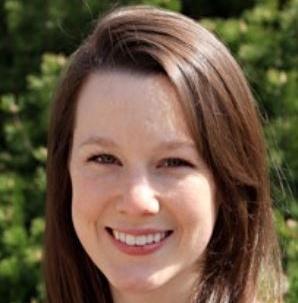
Julia Gamache, PhD, was one of four new scholars welcomed into the Duke Clinical and Translational Science Award’s (CTSA TL1) programs this April. Gamache, a postdoctoral associate in the Chiba-Falek lab, will use the two-year award to study the origins of Alzheimer’s disease and investigate novel therapeutic strategies for the condition. The Duke CTSA TL1 postdoctoral program is a 2-year training program aiming to provide 2 years of funded time to support the research training of outstanding junior scientists.
The other new participants are: Jeff Federspiel, MD, PhD, J. Spencer Hauck, PhD and Charley Pyle, PhD, PharmD
(A version of this story originally appeared on the CTSI's website. Read that version here.)
Julia Gamache, PhD
Since arriving at Duke, Julia Gamache has worked in the lab of Ornit Chiba-Falek, PhD, researching the genetic underpinnings of late-onset Alzheimer’s disease. Gamache studies brain tissue samples using single-cell genomics technologies, a relatively new form of technology for this type of analysis.
“I’ve always been interested in the complexity of Alzheimer’s,” she said. “By looking at the genetic level, we can perhaps give more clarity to the pathogenesis of the disease and develop more ideas for novel therapeutic strategies.”
Gamache learned about the TL1 program from a fellow postdoc in her lab. As someone who is new to genomics and handling large data sets, she thought the program would be an excellent opportunity to sharpen her skills in those areas.
“I have a lot to learn from my mentor team,” Gamache said. “I’m also excited to earn more money to take courses that will help create a well-rounded training experience for me at Duke.”
Jeff Federspiel, MD, PhD
As a high-risk obstetrician caring for unborn babies and expectant moms with health challenges, Jeff Federspiel’s work is concerned with the high maternal mortality rate in the U.S. He is currently researching ways to better predict and prevent pulmonary embolisms (blood clots in the lungs) in pregnant women.
While research suggests that women who undergo cesarean sections are at even higher risk for blood clots that patients who undergo vaginal deliveries, identifying who is at the highest risk and should receive preventative therapies remains unclear. That is why Federspiel felt it was important to pursue this research.
“As a working doctor who has practiced in several different hospitals, I have found that people have very different opinions about which patients need these preventative therapies, leading to differences in how people are treated,” Federspiel said. “I’m hoping that our research will help produce evidence-based answers.”
Federspiel heard about the TL1 program from Geeta Swamy, MD, Associate Vice President for Research at Duke. His primary mentor is Andra James, MD, Professor of Maternal Fetal Medicine and Consulting Professor of Medicine. He said he is looking forward to working with talented people from across Duke and getting different perspectives and feedback on his research.
“I am delighted and honored to be a TL1 scholar,” Federspiel said. “I’m looking forward to building my research skills and taking advantage of all Duke has to offer.”
J. Spencer Hauck, PhD
J. Spencer Hauck is investigating heat shock factor 1 (HSF1) in promoting aggressive prostate cancer. Through his TL1 proposal, Hauck will evaluate if HSF1 promotes cancer growth by modifying the Transsulfuration Pathway, which is responsible for the production of cellular energy and antioxidants. Hauck’s ultimate goal is to determine how HSF1 drives prostate cancer progression in order to develop novel therapeutic options for advanced prostate cancer patients who have limited therapeutic options.
“We want to understand how HSF1 promotes prostate cancer,” he said. “When we knockdown HSF1, we see cancer cells grow more slowly. We ultimately want to be able to find ways to stop prostate cancer from growing.”
Hauck learned about the TL1 program from his mentor, Jiaoti Huang, MD. He thought the program was a great fit for him and a great opportunity to learn and move his career at Duke forward.
“I liked how the coursework for the TL1 program fit in with what I’m working on,” Hauck said. “During my time at Duke, I’m excited that I get to take advantage of these opportunities and build toward research independence.”
Charley Pyle, PhD, PharmD
Charley Pyle is interested in the changing landscape of the human innate immune system during infection. His research currently focuses on the pathogenesis of tuberculosis. To simulate and study this, Pyle and his team are looking at cell structures in zebrafish.
“Lots of malfunctions can occur in infectious diseases, cancers, and autoimmune diseases,” he said. “I went into grad school interested in finding ways to modify immune responses to these changes.”
Pyle’s research mentor, Dr. David Tobin, recommended he apply to the TL1 program. Pyle said he is excited for the opportunity to network with Duke clinicians and fellow scholars, as well as access to free consultations in areas like biostatistics.
“My background is in translational research, and it’s something I’m very passionate about,” he said. “We’re trying to move clinical medicine forward to benefit people, and I feel that mission is in line with what the program is about.”